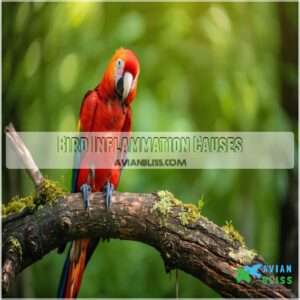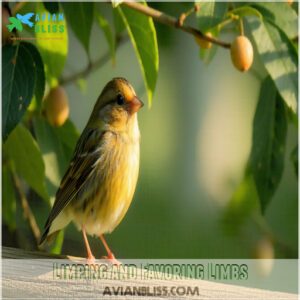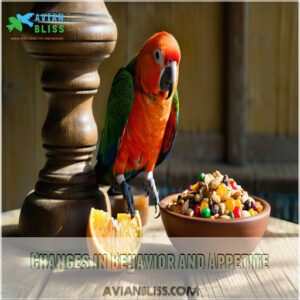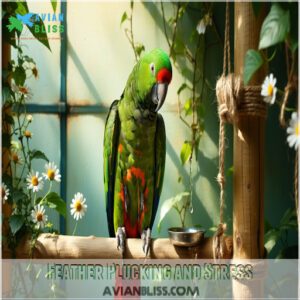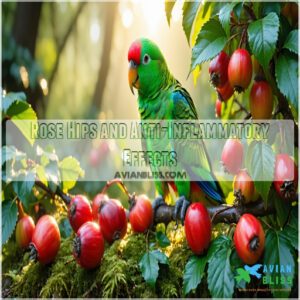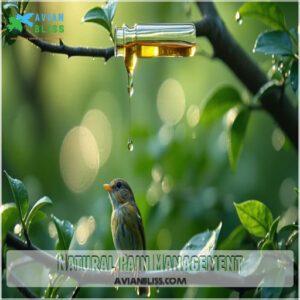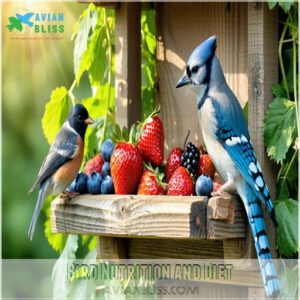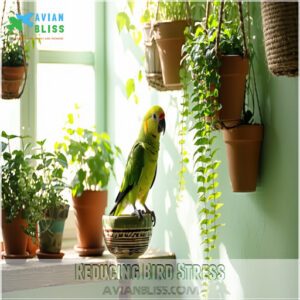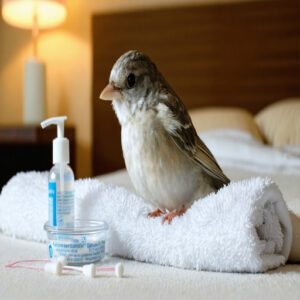This site is supported by our readers. We may earn a commission, at no cost to you, if you purchase through links.

Natural bird wellness remedies like turmeric, ginger, and rose hips can ease inflammation while supporting overall healing. Turmeric’s curcumin works wonders for swollen joints, while ginger brings natural pain relief. Rose hips provide a vitamin-rich antioxidant boost, making your feathered friend feel their best.
A balanced diet with omega-3s, fresh produce, and healthy pellets also plays a huge role in keeping their feathers shiny and joints strong. Watch for changes like limping or feather plucking—it’s their way of saying something’s wrong.
With natural care, you’re giving them the comfort they deserve.
Table Of Contents
- Key Takeaways
- Bird Inflammation Causes
- Recognizing Bird Inflammation
- Natural Inflammation Relief
- Natural Pain Management
- Bird Nutrition and Diet
- Natural Supplements for Birds
- Reducing Bird Stress
- Frequently Asked Questions (FAQs)
- How can I Help my Bird Eat a healthy diet?
- Do birds need natural care?
- What is a good diet for calming birds?
- How can I help my bird with arthritis?
- Can chamomile & lemon balm help with stress in birds?
- How can a feathered bird be calming?
- How to treat a sick bird at home naturally?
- What is the best natural antibiotic for birds?
- What is a natural sedative for birds?
- What is a natural antiviral for the bird flu?
- Conclusion
Key Takeaways
- Watch for signs like limping, feather plucking, or behavior changes to catch health issues early and act quickly.
- Use natural remedies like turmeric, ginger, and rose hips to reduce inflammation and ease your bird’s discomfort.
- Provide a balanced diet with omega-3s, fresh produce, and varied ingredients to support overall health and vibrant feathers.
- Create a calm, enriched environment with mental stimulation and stress-relief techniques to keep your bird happy and healthy.
Bird Inflammation Causes
Your bird’s discomfort from inflammation can stem from various causes, including arthritis, injuries, and connective tissue problems that affect their joints and overall mobility.
When you notice your feathered friend favoring a limb or showing signs of pain, it’s essential to identify the root cause quickly since one day of bird illness equals seven human days, emphasizing the need for swift action to address the inflammation.
Arthritis in Birds
While arthritis commonly affects multiple joints in birds, osteoarthritis remains the most prevalent type you’ll encounter.
Your feathered friend’s joints can become inflamed and painful, affecting their quality of life. Birds often exhibit reduced activity levels, difficulty perching, or changes in gait due to avian arthritis pain.
Bird joints often develop arthritis from pre-existing diseases, leading to discomfort that requires natural pain relief. Understanding avian therapy options and focusing on joint health through bird rehabilitation can help manage inflammation in birds effectively.
Joint Defects and Injuries
Your feathered friend’s joint issues often stem from unexpected injuries or developmental defects that weren’t apparent at first.
Proper bird leg injury assessment is essential for effective treatment.
When managing bird joint pain, it’s critical to understand these common causes:
- Breeding-related skeletal deformities that affect joint alignment
- Impact injuries from flying accidents or improper landing
- Nutritional imbalances leading to weakened joint structures
Natural pain relief options, combined with proper avian physical therapy, can help your bird bounce back from these challenges while minimizing inflammation.
Connective Tissue Disorders
While joint injuries often steal the spotlight, your bird’s connective tissue disorders deserve equal attention.
These conditions affect the intricate network of tissues supporting bones and organs, leading to inflammation and discomfort. Birds can benefit from natural anti-inflammatory support.
Let’s explore common issues and their management:
| Tissue Type | Common Issues | Natural Support |
|---|---|---|
| Cartilage | Deterioration | Turmeric, Ginger |
| Ligaments | Stretching | Rose Hips, Clay |
| Tendons | Inflammation | Ceylon Cinnamon |
| Fascia | Stiffness | Fish Oil, Herbs |
| Fibrous Tissue | Weakness | Bee Pollen, Krill |
Your bird’s tissue repair journey requires patience and consistent care with anti-inflammatory plants and natural pain management approaches, including the use of turmeric and other supportive methods.
Recognizing Bird Inflammation
You’ll notice when your feathered friend isn’t feeling their best by watching for signs like limping, fluffed feathers, or changes in their usual perching habits.
If you spot your bird favoring one leg or wing, showing reduced interest in activities, or displaying unusual behavior like aggression or feather plucking, they might be dealing with inflammation that needs your attention.
Limping and Favoring Limbs
Limping or favoring a limb can signal limb injuries or inflammation in birds.
Watch for these signs:
- Lack of perching: Struggling with balance.
- Favoring a wing or leg: Subtle but telling.
- Physical changes: Swelling near joints.
- Behavior shifts: Reluctance to climb or play.
- Visible pain: Fluffed feathers or reduced movement.
Always prioritize bird joint health with early vet visits.
Changes in Behavior and Appetite
Behavioral signs like sudden aggression or lethargy, paired with appetite changes, often signal bird stress or avian anxiety disorders.
Stress factors, including routine disruption, can upset bird behavior drastically. Keep an eye on reduced food intake or unusual cravings.
Nutrition therapy, using diverse, fresh foods, can help restore balance. Act quickly—natural bird wellness remedies support healing before issues escalate, and it is crucial to address avian anxiety disorders and maintain bird behavior.
Feather Plucking and Stress
Why do birds pluck their feathers? It’s often a cry for help, signaling stress or discomfort.
Here’s how to help:
- Feather Care: Provide regular baths and proper humidity.
- Bird Calming: Create a quiet, stress-free habitat.
- Behavioral Therapy: Provide enriching activities.
- Natural Bird Stress Remedies: Use calming herbs like chamomile for bird stress relief and anxiety.
Your bird deserves peace!
Natural Inflammation Relief
When your bird shows signs of inflammation, natural remedies like turmeric, ginger, and rose hips can provide gentle relief while supporting overall healing.
These options not only reduce swelling and discomfort but also promote long-term wellness with minimal side effects, which can be considered a form of gentle relief and support overall healing.
Turmeric and Curcumin Benefits
Turmeric is a powerful ally in bird wellness.
Packed with curcumin, a natural anti-inflammatory, it helps reduce bird inflammation symptoms.
Adding turmeric to food supports natural healing and promotes comfort.
Always use fresh turmeric root for safety, as contamination in powders can occur.
You can find bird turmeric supplements online.
Moderation is key—too much turmeric isn’t ideal, but it’s one of nature’s best natural pain relief plants!
Ginger and Ceylon Cinnamon Properties
Regarding bird inflammation symptoms, ginger and Ceylon cinnamon shine as anti-inflammatory natural remedies.
Ginger benefits include reducing inflammation and offering natural pain relief. Ceylon cinnamon, the safe choice for birds, fights inflammation while supporting health.
Consider a bird ginger supplement to conveniently administer ginger. Both herbal supplements can be sprinkled into their diet—simple, effective natural bird wellness remedies to keep your feathered friend feeling great, with natural remedies and Ceylon cinnamon.
Rose Hips and Anti-Inflammatory Effects
Building on ginger and cinnamon’s benefits, rose hips shine as a powerhouse among anti-inflammatory plants.
These tiny fruits, packed with vitamin therapy and antioxidants, help ease inflammation in birds naturally.
Consider natural bird food supplements for additional nutritional support.
Whether used as a treat or mixed into meals, this herbal remedy offers gentle, effective natural pain relief for feathered friends.
Always consult your vet before introducing natural bird wellness remedies.
Natural Pain Management
When your bird seems uncomfortable or in pain, natural pain management can offer safe, gentle support.
With the right remedies, you can ease their discomfort while keeping side effects to a minimum.
Pros of Natural Remedies
Natural bird remedies offer gentler solutions for pain relief, aligning with holistic bird care.
Compared to prescriptions, herbal therapy and organic supplements often come with fewer side effects and foster better bird wellness.
Combining natural healing with daily routines, like turmeric for inflammation or ginger for discomfort, helps support recovery while maintaining your feathered friend’s comfort and overall health.
Cons of Natural Pain Relief
Natural pain relief for birds has its downsides.
Remedies like turmeric or ginger may fall short for severe pain, leaving your bird uncomfortable longer. Misjudging doses can cause side effects or even harm.
With limited research on bird arthritis remedies, there’s uncertainty. Some natural options risk negative interactions with medications, complicating bird pain management.
- Variable Efficacy: Severe cases may persist.
- Dosage Challenges: Precise measures are tricky.
- Side Effects: Some natural ingredients irritate.
- Interaction Risks: Interfere with prescribed meds.
- Limited Research: Effects not fully understood.
Importance of Veterinary Consultation
Don’t skip veterinary care—it’s the backbone of bird wellness.
Regular bird checkups with avian vets maintain health monitoring and catch issues early.
Relying solely on natural bird health remedies or bird health supplements may mask underlying problems.
For emergencies or chronic pain, seek preventive medicine and emergency visits promptly.
A vet’s expertise keeps your feathered friend thriving longer.
Bird Nutrition and Diet
Feeding your bird a healthy, balanced diet is one of the most important ways to keep them happy and thriving.
By focusing on fresh foods, essential nutrients, and variety, you can support their overall well-being and prevent common health issues.
Commercial Pellets and Fresh Foods
A balanced diet is essential for avian nutrition, but commercial bird food, like pellets, has limitations.
Fresh bird food offers better nutrients and mimics natural bird health. You can find a variety of suitable fresh bird food online.
- Fresh Food Options: Add fruits, veggies, and grains for dietary variety.
- Pellet Limitations: Use pellets sparingly, not as a sole diet.
- Seed Alternatives: Rotate seeds with organic bird food options.
Essential Fatty Acids and Omega-3
Fresh foods bring variety, but your bird also needs essential fatty acids for healthy feathers and avian wellness.
Omega-3s, found in algae and omega-rich seeds like flaxseed and chia, are key to bird nutrition. They support skin, feathers, and overall health.
Add natural bird supplements carefully for balance. Always check these sources match your bird’s specific needs for safe supplementation to ensure they receive the necessary omega-3s.
Bird Chop and Variety of Ingredients
A colorful bird chop isn’t just food; it’s an experience.
Birds crave fresh foods mimicking their wild diet.
A balanced small bird food mix includes various seeds, nuts, and dried fruits.
Chop recipes blend vegetables like kale, carrots, and squash with grains and seeds for a nutrient balance.
Customizing bird chop makes sure picky eaters thrive.
Remember: rotate ingredients often to keep your parrot’s diet dynamic, healthy, and exciting!
Natural Supplements for Birds
When your bird’s health needs a boost, natural supplements can offer safe and effective support. From improving digestion to enhancing immunity, these remedies help your feathered friend thrive.
Calcium Montmorillonite Clay Benefits
Clay therapy isn’t just a trend; it’s been boosting avian wellness for centuries.
Calcium montmorillonite clay offers powerful bird health remedies with its natural detox abilities. It enhances bird digestion while providing over 60 mineral supplements.
Benefits include:
- Removing toxins and heavy metals.
- Supporting nutrient absorption and gut health.
- Fighting bad bacteria naturally.
- Detoxifying for better overall wellness.
Birds thrive with this natural aid, utilizing natural detox abilities to improve their health.
Oyster Shell and Fertility Support
Oyster shell supplements are a game-changer for avian fertility, as they provide essential calcium support for stronger bird eggshells and improved reproductive health.
A fertility boost can mean more consistent egg production for your feathered friend.
| Benefit | Impact |
|---|---|
| Calcium Support | Strengthens eggshells |
| Fertility Boost | Enhances reproduction |
| Natural Bird Wellness | Promotes overall health |
| Eggshell Improvements | Healthier bird eggs |
Herbal Supplements and Stress Relief
Herbal remedies can soothe your bird’s stress and anxiety while promoting holistic wellness.
For effective natural stress relief, try these bird anxiety remedies:
- Chamomile: A natural sedative for calming bird nerves.
- Lavender: Known for bird aromatherapy benefits.
- Mint: Supports digestion and relaxation.
- Valerian Root: A powerful bird calming supplement.
- Basil: Reduces tension, aiding stress management.
Always consult your vet first!
Reducing Bird Stress
Stress can take a serious toll on your bird’s health, leading to issues like feather plucking or a weakened immune system.
By creating a calm environment and offering engaging activities, you can help your feathered friend feel safe and happy.
Creating a Comfortable Habitat
A well-designed bird environment helps reduce stress.
Use varied bird perches, cozy nesting boxes, and thoughtful lighting systems to mimic natural conditions.
Environmental enrichment, like fresh leaves or ropes, encourages natural behaviors.
Place housing in quiet areas, away from loud noises.
Proper bird social interaction and a safe space for movement make your feathered friend feel secure and content.
Mental Stimulation and Exercise
Keeping your bird mentally engaged and physically active is key to reducing stress.
Try these enrichment ideas:
- Mental games: Use puzzle toys or food modeling to mimic foraging.
- Exercise routines: Encourage climbing, flying, or playing with bird toys daily.
- Social interaction: Spend time together, mimicking parrot behavior, or introduce new foraging toys.
A happy, occupied bird rarely feels stressed!
Natural Stress Reduction Techniques
Creating a stress-free environment is essential for avian mindfulness.
Use calming techniques like soothing sounds or quiet spaces for natural relaxation.
Bird meditation isn’t a stretch—gentle hand-feeding or slow blinking builds trust.
Understanding stress-induced feather plucking can greatly improve bird welfare.
Offer stress-free perches and avoid sudden changes to reduce bird anxiety.
These natural stress relief methods keep your feathered friend calm, happy, and healthier.
Stress reduction in birds matters!
Frequently Asked Questions (FAQs)
How can I Help my Bird Eat a healthy diet?
Like offering a buffet for a picky eater, provide your bird with a colorful mix of fresh fruits, vegetables, grains, and seeds.
Introduce new foods gradually, and mimic foraging to keep meals fun!
Do birds need natural care?
Birds thrive with natural care, including fresh foods, mental stimulation, and holistic remedies.
It’s like giving them a slice of the wild.
Prioritize their well-being by focusing on balanced diets, enriched environments, and observing their needs.
What is a good diet for calming birds?
Did you know stress can reduce a bird’s lifespan?
A calming diet includes magnesium-rich seeds like flax or pumpkin, chamomile flowers for relaxation, and fresh, diverse veggies.
Pair it with enrichment for happy, peaceful birds!
How can I help my bird with arthritis?
Help your bird with arthritis by providing natural anti-inflammatory foods like turmeric, ginger, and rose hips.
Make certain perches are soft and varied in size to reduce joint strain.
Always consult your avian vet for guidance!
Can chamomile & lemon balm help with stress in birds?
Imagine a soothing cup of tea for your bird—chamomile and lemon balm work wonders!
Chamomile calms nerves, while lemon balm eases anxiety.
Just make sure proper preparation and dosage to keep your feathered friend safe and stress-free.
How can a feathered bird be calming?
A calm and content bird naturally soothes its surroundings.
Their gentle chirps, rhythmic feather preening, and relaxed demeanor can ease stress.
Providing a safe, stimulating environment fosters this natural calm, strengthening their bond with you, through a process that is both naturally calming.
How to treat a sick bird at home naturally?
Picture your bird fluffing up, looking miserable.
Boost hydration with a pinch of electrolytes, like Pedialyte.
Offer warmth, turmeric-enhanced food, and soft chopped veggies.
Monitor closely—if symptoms persist, consult an avian vet immediately.
What is the best natural antibiotic for birds?
Garlic is a natural antibiotic for birds, thanks to its antiviral and antibacterial properties.
Just use small amounts mixed into their food; too much can harm them.
Always consult your vet before making dietary changes!
What is a natural sedative for birds?
Chamomile is a natural sedative for birds.
It’s gentle and can calm their nerves without causing harm.
You can brew a weak tea and add drops to their water, promoting relaxation naturally.
What is a natural antiviral for the bird flu?
Turmeric, ginger, and garlic are powerful natural antivirals for bird flu.
Turmeric’s curcumin combats viruses, ginger boosts immunity, and garlic has antiviral properties to fight infections.
Always consult your vet before trying new remedies.
Conclusion
Caring for your bird is like tending a delicate flower—it thrives with attention and the right care.
Natural bird wellness remedies, like turmeric and rose hips, can boost their health while easing discomfort.
Pair these with a varied diet, mental stimulation, and a cozy habitat to keep them thriving.
Watch for signs like feather plucking or limping and act quickly to provide natural support and ensure your bird lives a happy, healthy life.
With love and the right approach, you’ll help your feathered friend flourish.
- https://www.boldsky.com/health/wellness/herbal-home-remedies-to-fight-bird-flu-134524.html
- https://www.nhvnaturalpetproducts.com/other-pets/birds/remedies-by-breed/
- https://www.apexbirdcontrol.uk/article/natural-bird-repellent-home-remedies
- http://burgebirdservices.homestead.com/Plucking.html
- https://www.sciencedirect.com/science/article/pii/S0032579119457349

